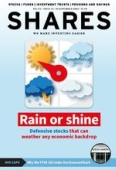Archived article
Please note that tax, investment, pension and ISA rules can change and the information and any views contained in this article may now be inaccurate.
Rain or shine – the defensive stocks that can weather any economic backdrop

The classic definition of a ‘defensive’ stock is one which provides stable earnings and consistent returns in all market environments, but especially when market conditions are tough.
They usually have a big installed customer base, so there is a constant demand for their products or services, and they tend to operate in what is known as an oligopoly or an area of limited competition.
However, as we show in this article, some stocks which seem to fit the defensive tag can turn out to be plodders while some which seem riskier can be a better investment.
WHICH STOCKS ARE TRADITIONALLY DEFENSIVE?
For many years consumer staples, healthcare, personal care, telecoms, and utilities companies have been viewed as defensive.
Defensive stocks tend to have good balance sheets, so that when the economy turns down they can weather the storm and keep investing in the business while maintaining their dividend without having to look for outside financing.
Another feature of defensive stocks which matters for investors is the fact their share prices tend not to be very volatile, in other words they have a low ‘beta’ compared with the market.
In a paper written in 2016, professor Robert Novy-Marx of the University of Rochester, New York, looked at the popularity of defensive stocks and explained what drives their performance. He said: ‘Low volatility and low beta strategies are popular with institutional investors, pension funds, and insurance companies. Retail defensive equity funds have also seen robust inflows and compete with “quality” strategies and managed futures as the new strategies most favoured by active managers.’
Defensiveness doesn’t depend on a company’s size – although larger stocks tend to be less volatile than smaller stocks – or its valuation, although that can be a contributing factor, argued Novy-Marx. It all comes down to profitability.
He commented: ‘High profitability is the single most significant predictor of low volatility, exceeding the power even of market capitalisation. Defensive strategies consequently tilt strongly towards profitability. This also tends to obscure the true extent to which defensive strategies tilt toward value.’
Because profitability and value tend to be negatively correlated, the ‘profitability effect’ of holding defensive stocks outweighs the ‘value effect’ said Novy-Marx.
In other words, classic defensive stocks may be larger and cheaper than the average company but what makes a company truly defensive is the reliability of its earnings.
HOW DO CLASSIC DEFENSIVES MEASURE UP?
To test both the market wisdom that sectors like healthcare, and consumer staples are defensive, and professor Novy-Marx’s finding that companies with higher profitability are defensive, we have taken four well-known stocks from the S&P 500 at random.
All are household names, and all have been going about their business without any significant acquisitions or disposals within the last 10 to 12 years which might distort their earnings.
In each case we have taken diluted underlying earnings per share as reported under US GAAP (generally accepted accounting principles).
Thanks to its formidable marketing, Coca-Cola (KO:NYSE) is possibly the best-known brand in the world if not necessarily the most highly valued – that accolade goes to Apple (AAPL:NASDAQ).
Coca-Cola is famous for reliably growing its earnings through thick and thin as consumers gulp down its fizzy drinks, either at home or in restaurants and bars the world over.
However, between the end of 2009 and the end of 2021 the firm has only grown its earnings per share by 53%, and this year earnings are expected to fall slightly.
As a rule of thumb, if earnings grow at 7% per year, then in 10 years they will have doubled.
At the same time, by reversing the formula, if earnings grow at 10% per year, then they will double in seven years.
Coca-Cola earnings clearly haven’t doubled, nor have they grown by 7% a year (and we’re being generous here as we’re looking at 12 years not 10).
By the same token, personal care firm Johnson & Johnson (JNJ:NYSE) – which, like UK group Reckitt (RKT), sells small-ticket instantly-recognisable branded consumer health products around the world – ought to generate a resilient flow of earnings.
Yet over the same period from the end of 2009 to the end of 2021 the firm has grown its per-share earnings by 77%, meaning it too has failed to beat the 7% per year hurdle.
If we included the forecast for 2022, earnings would only be up 69% as the forecast for this year is for profits to fall by mid-single digits like Coca-Cola.
If we took a hospitality company on the other hand, specifically restaurant operator McDonald’s (MCD:NYSE), it would be reasonable to assume its business was dependent on consumer confidence and that the repeated lockdowns caused by the pandemic had a devastating impact on earnings.
Yet, over the same period as the other two stocks, McDonald’s hasn’t just doubled its earnings, it has increased them by 143% with surprisingly little lasting damage from Covid.
Even more unexpectedly, manufacturing group 3M (MMM:NYSE), which produces everything from stationery to industrial coatings and materials for the automotive and aerospace sectors, has also more than doubled its earnings, again showing very little impact from the pandemic.
What this shows is that what may look like a defensive stock doesn’t necessarily behave like one in terms of earnings, while stocks which might appear to be cyclical or tied to consumer discretionary spending can turn out to be more defensive than they seem at first glance.
For the record, investor Warren Buffett doesn’t buy stocks because they are defensive, he buys them because he has high conviction in their business models. If he wants to be defensive, he dials down his exposure to equities altogether.
IS IT THE SAME STORY FOR UK ‘DEFENSIVES’?
While we don’t have quite the same calibre of companies to choose from in the UK, the same principles would seem to apply here as in the US market.
For classic defensive stocks we have looked at the earnings profile of cigarette maker British American Tobacco (BATS) and consumer goods and healthcare giant Unilever (ULVR), while for more cyclical business we have analysed pest control firm Rentokil (RTO) and fantasy miniatures maker Games Workshop (GAW).
This time we took diluted earnings per share from the end of 2012 to the end of 2021 using earnings from continuing operations to weed out gains on asset disposals.
Once again, the classic defensives under-clubbed it relative to the ostensibly more cyclical stocks with British American Tobacco posting 67% growth and Unilever posting 55% growth while Rentokil managed 116% growth and Games Workshop racked up a scarcely believable 633% growth.
Even if we account for forecast earnings for the current financial year, the so-called defensive stocks still come out second-best.
It could be argued Rentokil benefited from the pandemic due to the increase in demand for hygiene, but at the same time many of its customers had to shut their businesses for long periods of time so it was far from a one-way street.
Games Workshop enjoyed a quantum leap in earnings thanks to its decision to embrace digital marketing and get involved with the video games industry, and it is doubtful the firm will see the same uplift in earnings as it has in the last few years.
Yet what is clear is that stocks with what may appear to be the defensive qualities needed to ride out the ups and downs of the market don’t always do what they say on the tin, while stocks which might not pass the test at first glance can in fact turn out to do a better job.
Important information:
These articles are provided by Shares magazine which is published by AJ Bell Media, a part of AJ Bell. Shares is not written by AJ Bell.
Shares is provided for your general information and use and is not a personal recommendation to invest. It is not intended to be relied upon by you in making or not making any investment decisions. The investments referred to in these articles will not be suitable for all investors. If in doubt please seek appropriate independent financial advice.
Investors acting on the information in these articles do so at their own risk and AJ Bell Media and its staff do not accept liability for losses suffered by investors as a result of their investment decisions.
Issue contents
Feature
Great Ideas
News
- Mid-cap stocks reverse losing streak versus FTSE 100
- Why retail investors in JPMorgan Russian Securities are sounding the alarm on changes
- Veterinary group CVS plans to double profitability over the next five years
- Falling house prices and higher sales cancellations: why property market-related shares are down again
- Chinese stocks surge on prospect of end to strict Covid measures
- Hasbro hurt as toy demand drops following price hikes
- Strong customer demand puts Caterpillar shares 10% ahead on the year

 magazine
magazine








